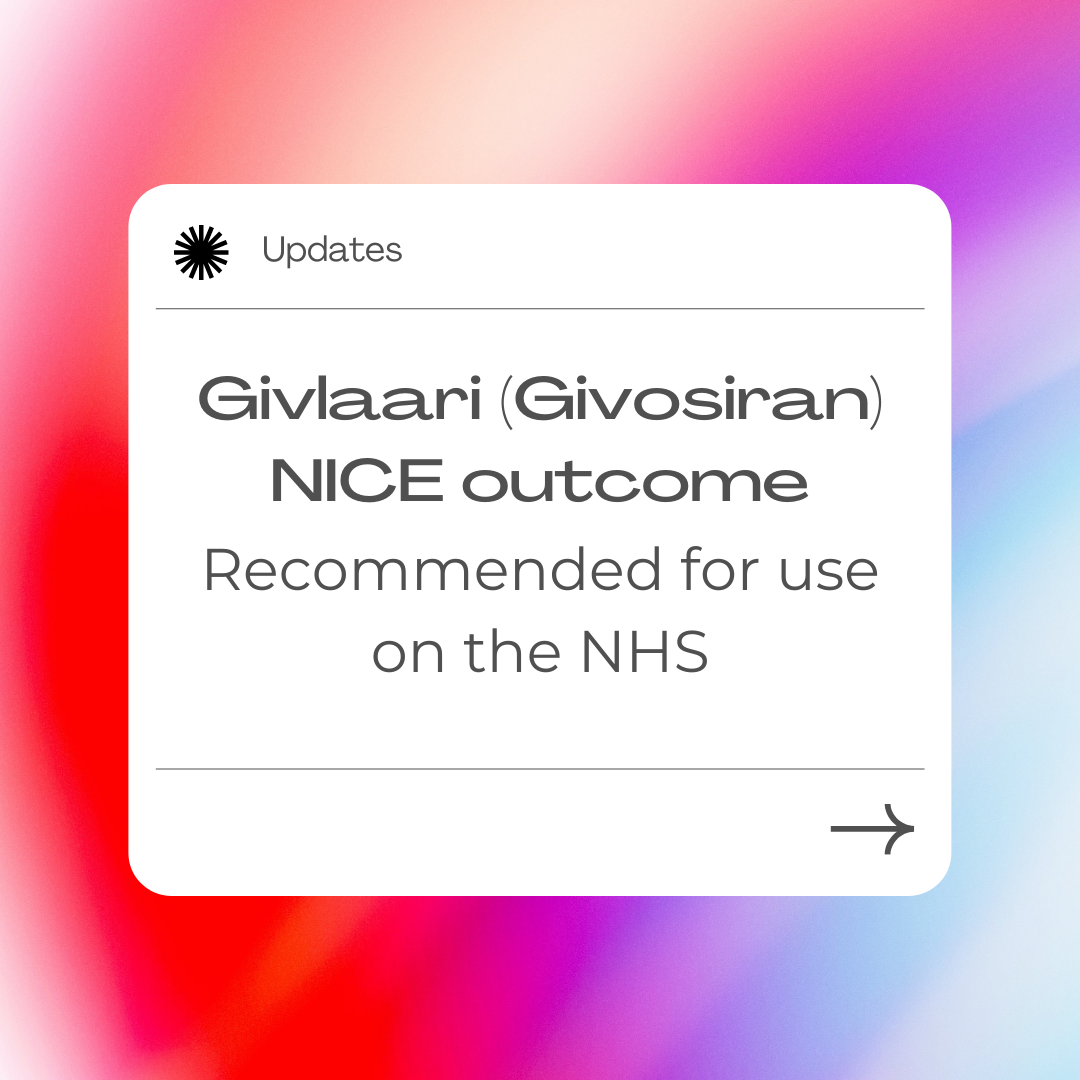Givlaari (Givosiran) updates
21 October 2021
When will it become available to patients?
Following the announcement, there will be a month-long appeal period. After that, the NHS will have three months/90 days to be able to organise getting the treatment to patients. So, by late February, eligible patients should be able to access the treatment where relevant. In the meantime please direct any questions you may have about your porphyria care and/or whether this treatment may be appropriate for you to your porphyria specialist.
Who will be able to be treated with Givosiran?
This treatment will be applicable for a small set of recurrent attack patients (those experiencing more than 4 attacks in a 12-month period). There will be strict criteria on adherence to the protocols for treating and it will initially, at least, have to be done through an expert centre due to the risk of anaphylaxis, and this travel may be difficult for some patients. All decisions on who will be prescribed Givosiran will be made via a multi-disciplinary team that will take these considerations and much more into account.

October 2021
For the last 18 months, Givosiran has been going through the NICE (National Institute for Care and Excellence) Highly Specialised Technologies (HST) process to try obtain approval for use on the NHS in England.
Initially the medication was ‘not recommended’, but we await the imminent outcome from a second committee meeting, which we hope will be more positive for those severely affected acute porphyria patients. Outcome expected in mid-late October – we’ll keep you updated as soon as we know more.
March 2020
Following the successful FDA marketing approval of Givlaari (Givosiran) for patients with acute hepatic porphyria in the United States, March 2020 saw Givlaari also being granted marketing authorisation by the European Commission (EC).
This is just the first step towards UK patients being able to access the preventative siRNA treatment. Approval means the drug is deemed safe and effective in the treatment of a disease. It is then down to national funding bodies to decide whether the drug is considered cost effective enough for treatment to be funded. Givlaari will soon start going through the NICE (National Institute for Care and Excellence) process to try to obtain approval for use/reimbursement by the NHS in England. Similar procedures will follow for Scotland and Wales. For more information, please see www.alnylam.com
April 2019
Recent months have seen exciting new developments in the world of acute porphyria. You might have seen lots of talk about ‘gene silencing’ in the media and on news channels. Gene silencing is the name given to a group of treatments that modify certain cells to effectively ‘silence’ those that cause problems. Gene silencing does not alter the DNA sequence.
Alnylam’s siRNA (small interfering RNA) trial drug, Givosiran, that we’ve introduced you to in the past, is a type of gene silencing treatment.
Last year, the Alnylam Phase III ENVISION trial enrolled 94 patients for a six-month period, where half of the patients were given the drug and half were given a placebo. In April, Givosiran was announced to have met its primary effectiveness endpoint with a 74% mean reduction (90% median reduction) in annual attack rate in AIP patients compared to the placebo.
Patients on Givosiran also saw a reduction in the use of haemarginate or hemin compared to the placebo group. Furthermore, levels of the neurotoxic liver components ALA and PBG, which are thought to cause attacks and other acute porphyria symptoms, were consistently lowered to a near normal level. To learn more about the full details visit: www.alnylam.com/2019/04/12/givo-easl-2019/
The results are highly encouraging and we’ll continue to watch developments eagerly.
So what does this mean to UK patients?
This does not have a direct impact on patients at this moment as the medicine development process is very long. Once a medicine has been created to treat a condition it is first checked for safety and effectiveness – which is what the trial study has been aiming to do.
The next step, is for the results of the study and other data to be presented to the European Medicines Agency (EMA), who will consider the medication’s risks and benefits and decide whether or not to approve it for marketing.
If the EMA approve the drug as eligible to be marketed in Europe, it will then need to be assessed by NICE (the National Institute for Care and Excellence), the independent body that makes decisions on how the NHS spend money on health care. If you have been following the progress of Scenesse through NICE, you will already be aware that this process alone is very lengthy.
But we are watching the process carefully and will be invited to take part to put the patient perspective forward in due course.
Find out more about the EMA process: www.ema.europa.eu/en/about-us/what-we-do
Find out more about NICE: www.nice.org.uk/about/what-we-do

